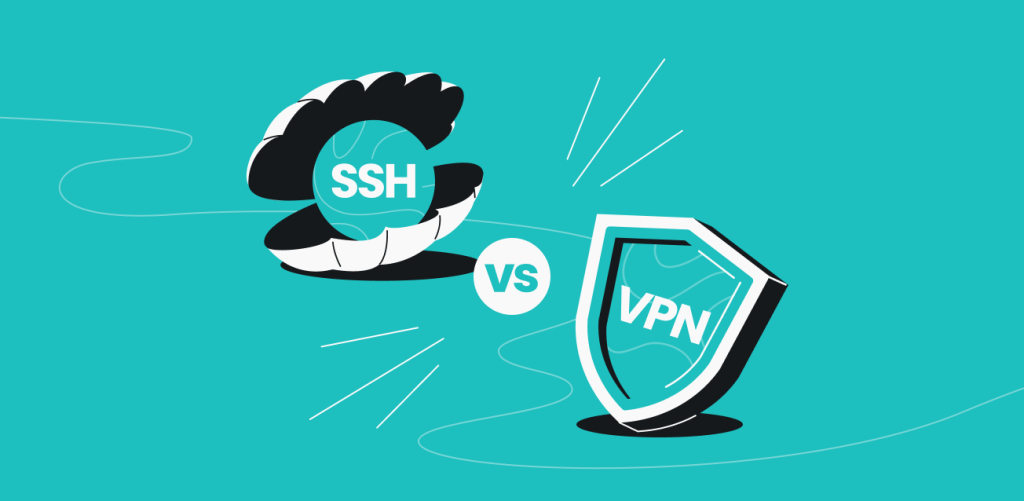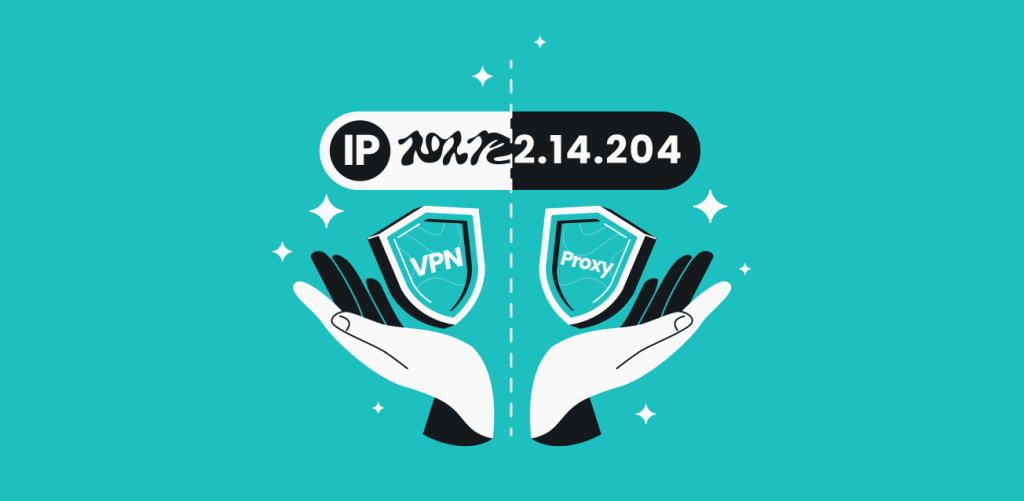
The internet is a fantastic place, but there are risks associated with heading online. From identity theft to phishing scams, protecting ourselves online is vital.
VPN (Virtual Private Network) and SSH (Secure Shell) technologies are designed to protect us while we complete our online tasks. The technologies work in pretty similar ways but don’t do the same thing. Let’s take a deeper look at both of them.
Table of contents
SSH vs. VPN: what is the difference?
VPNs and SSH systems both create secure “tunnels” for your data to travel through. These tunnels ensure that nobody other than the intended recipient can view or alter your data.
However, while an SSH connection only works on an application level, a VPN connection encrypts and protects all your data.
In other words, SSH tunneling will secure data exchanged between you and a remote server you have access to, while a VPN works to encrypt your entire network.
What is SSH?
SSH stands for “Secure Shell.” It is a network protocol that allows you to safely access remote devices and transfer data or run commands. This technology encrypts and disguises your traffic, ensuring the security of your connection.
This means that you can access network resources from practically anywhere. It’s particularly useful when you want secure communication between your computer at work and home.
How does it work?
Besides letting your devices communicate and access resources, an SSH protocol protects data. It does this with strong encryption capabilities, password authentication, and public-key authentication. This means your data is safe while the SSH client forwards it to the recipient device.
You need some technical knowledge to set up and use SSH, as it can be quite complicated. Of course, setting up a VPN from scratch would take more effort, but lucky for you, you can solve that by getting a VPN app – no coding required!
What is an SSH tunnel?
An SSH tunnel is an encrypted tunnel created by an SSH protocol. The encrypted SSH tunnel transfers unencrypted traffic to an SSH server, keeping it protected.
Thanks to its strong encryption, an SSH client can be configured to work as a SOCKS proxy (Socket Secure). This proxy creates a random IP (Internet Protocol) address before your data reaches its destination. Then, SOCKS uses the proxy to form TCP and UDP protocol connections through IP addresses.
This is where you can find similarities between SSH and a VPN. From the web’s perspective, your data is coming from the SSH server when using an SSH tunnel, just as is the case with VPN and its servers.
It’s also important to note that SSH tunnels must be set up per application, and you need to use terminal commands (rather than an app) to control them.
SSH Pros & Cons
Pros
- Features a less complicated server setup process for tech-savvy people than VPN connections do;
- Provides strong encryption to protect users from threats. These could include DNS leaks (Domain Name System leaks), IP address spoofing, IP source routing, data theft, and more;
- SSH tunnels make it simple to access a remote server or operate a remote terminal session between devices.
Cons
- Inexperienced users may find setup and management difficult;
- Every application you want remote access to will need an individual SSH connection; This can get complicated if you want to encrypt all your internet traffic.
What is a VPN?
A Virtual Private Network is a technology that protects your privacy online by routing your traffic through an encrypted tunnel.
Even if you connect to the internet using public Wi-Fi or an unsecured hotspot, you can rest assured that your data is secure within the VPN tunnel.
With a VPN, you can connect to a remote server from anywhere in the world with a simple click. This allows you to bypass restrictive firewalls or oppressive censorship rules, avoid geographical restrictions, and browse the internet safely.
We prohibit using Surfshark services for any unlawful purposes as it is against our Terms of Service. Please be sure to act in compliance with all applicable laws and regulations of other service providers.
How does it work?
VPN encryption disguises the traffic of an everyday internet user by routing it through a secure tunnel.
In other words, your data will travel from your computer to its destination by using a secure tunnel. The tunnel will disguise your traffic to make it look like it’s coming from a different location: protecting your identity and security online.
These features are great for checking in on your local football team or avoiding internet throttling from your data provider. If your provider cannot see what you’re doing online, they can no longer throttle your speed.
The VPN will also encrypt all traffic shared between the networks, shielding you from prying eyes.
VPN pros & cons
Pros
- An active VPN will immediately encrypt all traffic coming from your device. No coding or server controls are required;
- Premium VPN software offers worldwide server locations, allowing you to appear as though you’re anywhere in the world!
- VPNs are accessible to anyone – even if you don’t have any technical skills. Many even feature a “Quick Connect” button that allows you to secure your data immediately;
- VPNs secure all your network traffic, protecting your identity, data, and location, even when using unsecured public Wi-Fi networks;
- VPNs help hide your network usage, meaning your data provider can’t throttle your data.
Cons
- A VPN server can be complicated to set up at the server level (although if you’re using a premium VPN service like Surfshark, you won’t need to worry about this);
- It is crucial to be wary of free VPN providers as they may provide weak encryption or even sell your data.
SSH vs. VPN: which is more secure?
As far as encryption security is concerned, both options are equally safe. However, a VPN protects all your data, while an SSH only works on an application level.
A VPN is easier to set up and will provide more security to businesses and a vast majority of casual users, while an SSH offers a good safe-browsing option for tech-savvy individuals within their private networks.
SSH vs. VPN: benefits
So, an SSH tunnel will allow you to access another computer even when you’re nowhere near it.
With an SSH secure shell, you’ll generally be connected to a specific machine, and only the data you choose will be transferred. With a VPN, you’ll be effectively connected to a network where all your traffic is encrypted and protected.
SSH Benefits | VPN Benefits |
|---|---|
An SSH tunnel has a command-line focus. If you’re tech-savvy, this provides more flexibility and an easier technical setup process. | Most VPN users can simply download an app or extension to get started right away. So you don’t need to worry about complicated setup procedures. |
If you know scripts/coding, you can use an SSH tunnel to access files immediately. This makes it an excellent file-syncing solution. | If installed at the router, all web browsing traffic appears to come from the location selected by the VPN client. Depending on your VPN provider, this could be one of the thousands of locations worldwide. No need to set up individual apps or be restricted by geoblocking. |
An SSH server can manage remote devices, test software, install updates, and more. | A VPN connects your device to a server that can make it look like you’re anywhere else in the world. |
A casual user can use the SSH tunnel to manage their music library, emails, or personal files even when away from their device. | VPNs often have dedicated apps. This makes it easy for non-technical users to get started with a few clicks! |
SSH tunnels use strong symmetric encryption and hashing algorithms to ensure privacy. This provides a secure tunnel for accessing a device on the internet. | VPNs use strong encryption and hashing algorithms to ensure privacy. This provides a secure tunnel for all internet traffic. |
To wrap up: which tool is right for you?
A VPN is likely to be the best option for most day-to-day users.
Although the initial setup of a VPN is more complicated than building an SSH tunnel, most VPN users will benefit from systems that are already set up. So, all they need to do is download the app, log in to their account, and select a location. Meaning this isn’t a concern unless you plan to set up your own VPN server (unlikely).
That said, IT admins or anyone who needs to access a specific computer remotely might benefit more from SSH or a combination of both technologies to provide complete, encrypted access to their devices. It all comes down to your personal needs.
FAQ
Is SSH safer than a VPN?
No. On a smaller scale, SSH and a good VPN service are equally safe. However, since a VPN will protect your entire device or even your entire network, it is often more convenient to have.
Can you use SSH as a VPN?
An SSH tunnel cannot replace a VPN, but it does have one similar use case. If your primary need for a VPN is accessing your work device to share resources, you can also do this with an SSH tunnel. This gives you more control over the apps and information allowed to pass through than a VPN.
Is SSH over the internet secure?
Yes. SSH offers additional security, and sending data over SSH will always be safer than doing it with no additional security.
Do I need a VPN for SSH?
The simple answer is no; you don’t need to use a VPN for SSH. However, you might want to…
Because these aren’t competing technologies, you can connect to a VPN, then use an SSH server for an added layer of security.
Is SSH faster than a VPN?
There are many variables when it comes to SSH tunnel vs. VPN speed. The speed of your SSH connection can vary significantly depending on how you set it up. Meanwhile, the speed of your VPN has a lot to do with your VPN service provider, so if speed is a priority, make sure to choose a premium VPN.
Does SSH bypass a VPN?
A VPN tunnels and protects all traffic, which includes SSH. The two can be combined for extra security. If you need to use your real IP to connect to an SSH server, you can use our Bypasser feature to do so.




